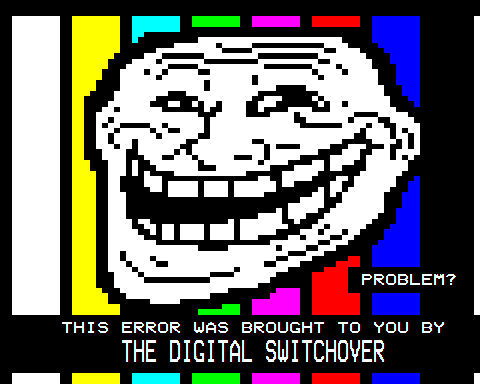However, Wikipedia's predecessor, the now defunct Nupedia, was initially written by a team of experts, much like a paper encyclopedia, with the aim of providing free-licensed content. All teletext content is subject to individual copyright, but Wikipedia is licensed under the GDFL, meaning its content can be freely distributed in its unedited format, commercially or noncommercially.
 Being an online service, Wikipedia naturally has the ability to transmit more content at a faster speed than teletext. Whereas teletext condenses information down to one or two sentence paragraphs, Wikipedia has the space and bandwidth to go into much more detail. Comparisons between teletext and the Simple English Wikipedia can be drawn, however, in their aims to articulate information in as simple terms as possible. The tabloid newspaper could also be placed in the same category, with its vocabulary limited in order to reach as large a reader base as possible. The BBC's Newsround (which is also broadcast on Ceefax) and many teletext services for children's channels utilise a simplified vocabulary to match the language skills of the reader base.
Being an online service, Wikipedia naturally has the ability to transmit more content at a faster speed than teletext. Whereas teletext condenses information down to one or two sentence paragraphs, Wikipedia has the space and bandwidth to go into much more detail. Comparisons between teletext and the Simple English Wikipedia can be drawn, however, in their aims to articulate information in as simple terms as possible. The tabloid newspaper could also be placed in the same category, with its vocabulary limited in order to reach as large a reader base as possible. The BBC's Newsround (which is also broadcast on Ceefax) and many teletext services for children's channels utilise a simplified vocabulary to match the language skills of the reader base.In other words, they use language that a teacher might use with schoolchildren. In this way, these formats could be seen as informal teaching aids, teletext helping children to learn colour and shape association, language and electronic interaction skills.
One function common to both Wikipedia and teletext is the ability to jump to a random page. On remote controls there is a button which brings up a random teletext page, whilst Wikipedia, like most wikis, has a 'Random page' text link on the sidebar. This function can be compared to Google's 'I'm Feeling Lucky' button when searching the web, only the user has no input as to what may appear.
 Much like other internet sites and technologies, Wikipedia has continued to grow, almost exponentially, since its creation. A single teletext service, due to bandwidth restrictions, only has the capability to grow to a certain size. Indeed, since 2000 Ceefax and Teletext have been continually downsizing, moving and removing pages from the service. The popularity of teletext, if anything, has declined and these measures are a reaction to this.
Much like other internet sites and technologies, Wikipedia has continued to grow, almost exponentially, since its creation. A single teletext service, due to bandwidth restrictions, only has the capability to grow to a certain size. Indeed, since 2000 Ceefax and Teletext have been continually downsizing, moving and removing pages from the service. The popularity of teletext, if anything, has declined and these measures are a reaction to this.It seems these factors, along with the greater ability to interact with and modify content, prove that Wikipedia will be the more popular information retrieval service in years to come. That is, unless the capability of teletext develops significantly. Maybe one day Interactive television will provide access to Wikipedia?



0 comments:
Post a Comment